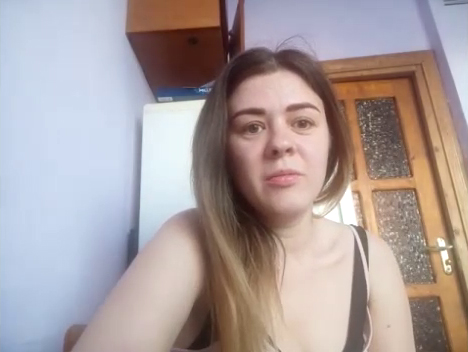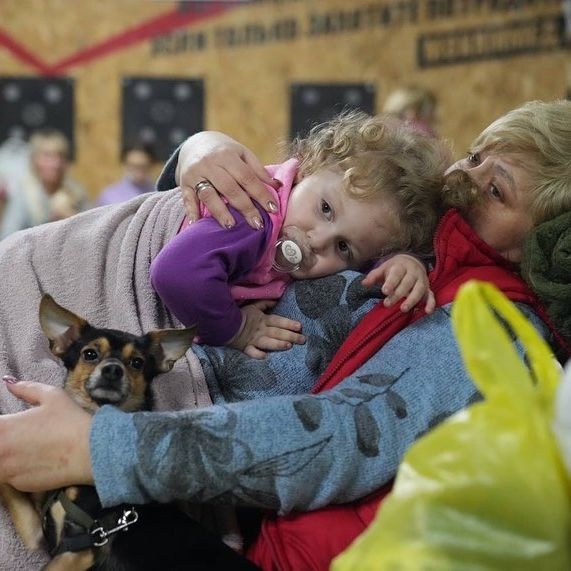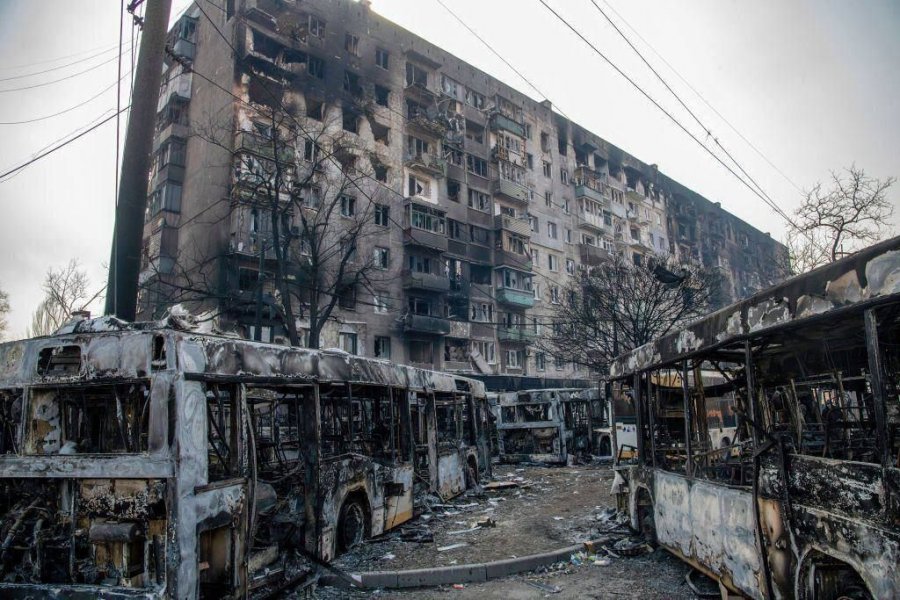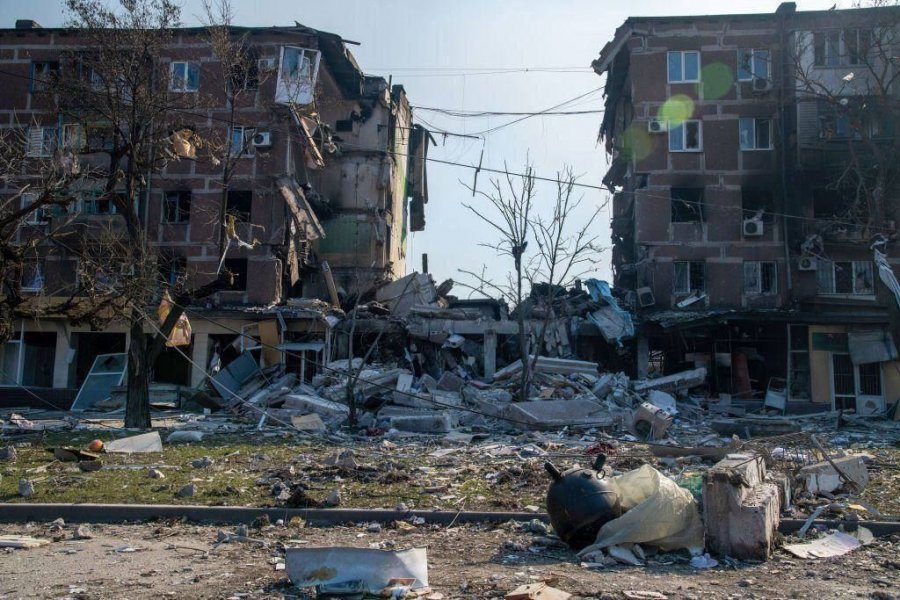‘There were more than five thousand of us in the shelter’, the first days of war in Mariupol

I am a soldier; I served in the 56th brigade. It is a combat brigade that is now in the war zone. My husband and I were in Mariupol. On 18 February, all the military received a telegram that we should arrive at the combat zone. However, I was eight months pregnant and applied for maternity leave. I just received it when on 24 February, everyone woke up from the sound of gunshots. I went to a neighbor and stayed with her. At first, we didn’t understand what was happening and started calling acquaintances. Even the military had no information. Then a friend called and said she would pick me up from the Left Bank.
In some areas, hostilities had already begun, but we still waited, hoping that perhaps everything would be quiet again.
Everyone thought it would be like in 2014: they would shoot outside the city, and that’s it. I was driven to the other end of the town. There were fewer shots. But every day, more and more. I left all my things at home, so I returned. I had no documents, no bank card, nothing. I stayed home for two days, and on 26 February, they started shelling the police station next to my house. My neighbor and I ran to the basement. It was not furnished, and there was no air to breathe, but people went down because it was a chance to stay alive. In a panic, we fled with nothing. However, when it was more or less quiet, we went up to take the documents.
The police came to us. They saw me pregnant and said: “We are evacuating women and children.” Some refused, some accepted, but I wasn’t asked. They just put me in a car and took me to another place, “TERRASPORT”, where they set up a bomb shelter. There was an old building with large columns, and in the middle was “TERRASPORT”, located in a basement.

There was still light and water there. Soldiers and volunteers brought food. They took me there alone. The rest of my family: my mother, grandmother, and younger brother (he is 13), were not with me. They live separately, and they have remained in Mariupol. They didn’t leave.
There was no phone connection, and it was impossible to call and ask who was where. However, the first week was more or less regular. People came to us for water because they didn’t have it.
They usually brought a large car with water to a district, and there was a queue for 5-6 hours, but not everyone had time to draw water. People went out and helped in whatever way they could. We had food brought by the military. There were more than 5,000 of us in the shelter, including babies. There were two more pregnant women in the ninth month of pregnancy, and they gave birth there. A third polyclinic and a military hospital were operating, and you could be taken there immediately after giving birth. Yevhen (the owner of the building) and others helped us. While there was still the Internet, they kept in touch with everyone and tried to find some way out so we could leave. We waited for the corridor to open but in vain.

The connection began to appear near the large office of Kyivstar’s “1000 little things”. There was the last tower, and we went there to catch phone connections in between shelling. The men cooked food on the fire under bombardments while women and children stayed inside. We went out for the first 2-3 days but didn’t go anywhere for the last seven days. Only one store was left, and I went there once to get milk (they let me skip the line because I was pregnant).
The products were spoiled, but they were sold, not given away. People stood in line from four in the morning, and fights frequently began. It did not matter that there were women and children.
There was nothing to eat, and people did not know how to survive or where to get food. Some had some supplies, but others had nothing. Some made fires on the streets, but when concrete pillars fly at you, when houses around you are burning, and no one extinguishes it, you don’t want to go outside again. So the police officers who remained drove around and helped as long as there was gasoline. They helped to evacuate children, especially from the Left Bank. However, their leadership and DSNS [State Emergency Service of Ukraine] left.

Later, the bridge was mined, and no one was allowed on the Left Bank. I tried to find information about my parents to bring them to me, but no one could pass because the bridge was mined. Some said there were no surviving houses on the Left Bank. As it turned out, some were there. It wasn’t easy to be out of touch. I could call my sister in Dnipro, but contacting my relatives in Mariupol was impossible. My husband (also a soldier) did not get in touch, and I did not know where he was. Only when he was wounded and brought to the Dnipro could I get through and find out that he was alive. Finally, in mid-March, we learned that driving out in our cars would be possible. We were running out of food but couldn’t go out to heat water for the babies. Then very heavy shelling began.
Previously, people came to the bomb shelter with some belongings, but for the last three days, they escaped in what they wore, bathrobes, slippers, and, sometimes, barefoot in the cold.
There was another story. Near our bomb shelter, Zhenia (the owner of the building) found a small bundle. It was a newborn. Someone brought the baby to us, but we realized that it was hard to survive in the basement and breathe. The shelling continued, and the guys took the child to the hospital. On the same day, a woman with burns was admitted there. Because the baby was covered in soot, we realized it was her child. So many people had burns, injuries, and shrapnel wounds. Someone lost their parents, someone else other relatives. It was very hard.
Soon street fighting began near us. We went outside on the 16 March and found tanks and Russian soldiers. They did not touch us but looked surprised: are there children here and pregnant women? And we are like — well, yes, there are. We didn’t just write “Shelter” and “Children” in capital letters for no reason. When street fighting began, acquaintances brought cars to take people out. Andrei gave his car to one family, and they took me, another girl with a child, and we drove to Berdiansk. We stayed there for a few days. The people there treated everyone with respect. The phone connections were working, and we found a family, which sheltered and fed us, and gave us some clothes. Unfortunately, they were also running out of food. And it was impossible to withdraw cash in Berdiansk.

We thought we were the only ones at war, but after we left, we saw that there was just the beginning of what we had in Mariupol. That is, there was no food in stores; it was impossible to withdraw cash, and the food in the market was only for cash. Most people had all the money on their cards or not at all. So many children developed rotavirus infection: fever, vomiting, and diarrhea. This happened because everyone was in basements, some with animals. There were nights when, despite the shelling, you tried to bring the children outside or give them a drink to get them to their senses. There were no more doctors available.
When we were in Berdiansk, a friend called me. She left Metinvest at Azovstal a few hours before the shelling began. She asked: “Are you alive?” — “Alive!” — “Where are you?” — “In Berdiansk.” “Finally, you didn’t give birth?” — “No, I am holding on.” She said she would pick me up and go to Western Ukraine. My husband was just being transported from the Dnipro to Khmelnytskyi. We managed to arrive in Lviv, she went with the child further abroad, but I stayed in Lviv. It is where I gave birth, and later my husband came. He could walk, his arms and legs were in place, and everything was fine.
What about your parents?
They got in touch. I thought that their house was destroyed. My aunt went abroad to Germany, but she said that it was challenging for her there because of the foreign language, and she needed a lot of documents. Her husband is now in Kryvyi Rih, but he could not leave; therefore, she would return. Mom said many stayed in Mariupol. Many acquaintances stayed because their housing would be given to people from Russia if they left, to the military, or anyone else. Grandma is 74 years old. Mom said if I were 74, I wouldn’t leave my house either.
My husband and I just bought an apartment in Mariupol, started renovations, and now we don’t have it. It was near the police station, and Russians bombed there. We saw videos and photos sent to the Viber group. There are just ruins. Shells hit the building, and then it burned down.
Nobody extinguished the fire, and everything burned out. However, the parents’ apartment is more or less intact. There are no windows, but they want to install new ones. They said they wouldn’t leave. Schools are opening there now, and my brother will study. Every day they go in search of water, and volunteers bring food. It’s summer now, but what will happen in winter... I don’t know, and I can’t persuade them to leave. They said there would be some work, but I don’t understand how it will end. Will there ever be Mariupol in Ukraine, or will it stay Russian? It is unknown. We watch the news daily, and there are no changes. Still, people survive there, and there haven’t been shooting lately. These are exceptional conditions for them when mines and shells do not fly overhead.